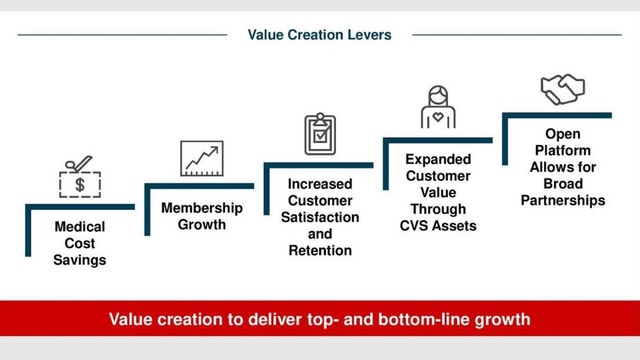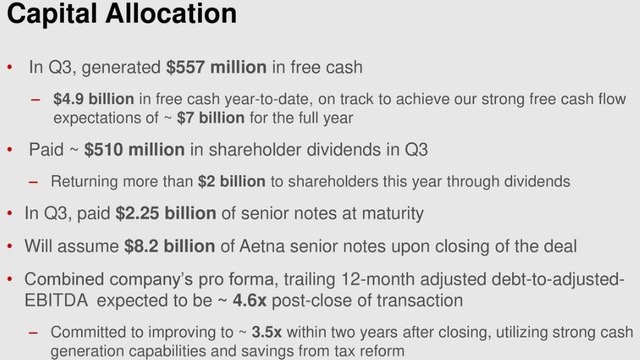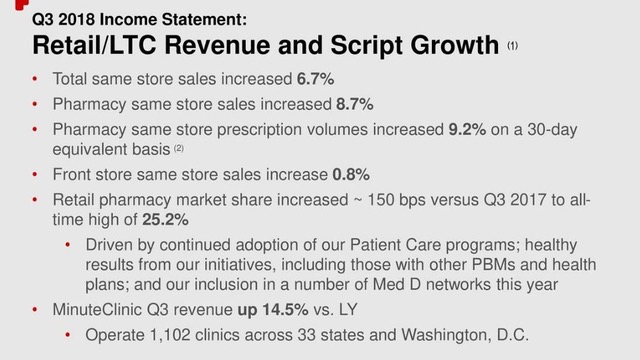Back in August, I had written an article highlighting the pharmaceutical supply chain cohort, presenting the case that these stocks were inexpensive in a very frothy market. Specifically, I profiled McKesson (MCK), Cardinal Health (CAH), CVS Health (CVS) and Walgreens Boots Alliance (WBA) and made the case that these stocks presented compelling value investments as all were near multi-year lows. The four companies above have healthy balance sheets and growing dividends while seizing partnerships and acquisitions to propel growth into the future. It’s no secret that these companies have been faced with several headwinds that have negatively impacted the growth and the changing marketplace conditions have plagued these stocks. The political backdrop has been a major headwind for the entire pharmaceutical supply chain (i.e., drug manufacturers, pharmaceutical wholesalers, and pharmacies/pharmacy benefit managers). Exacerbating the political climate, the drug pricing debate continues to rage on throughout political and social media circles weighing on the overarching sector. This backdrop erodes pricing power and margins of drugs that ultimately move from drug manufacturers to patients with insurers and other middlemen playing roles in the supply chain web. In an effort to address these headwinds and restore growth, companies within this cohort have made bold moves such as CVS acquiring Aetna (AET) to form a colossus bumper-to-bumper healthcare company and Cardinal Health shelling out $6.1 billion to acquire Medtronic's Patient Care, Deep Vein Thrombosis and Nutritional Insufficiency business. The overall cohort has been making bold acquisitions, heeding the competitive threats from the likes of Amazon (AMZN), possess great balance sheets, growing dividends, share buyback programs and more often than not posting growth albeit slower growth. These stocks presented value that provided a margin of safety that were largely de-risked considering the multi-year lows. Relative to the frothy market, these stocks were very inexpensive and witnessed a nice resurgence since proposing these stocks as value plays. CVS and Walgreens have retraced their 52-week highs as of late moving from their August lows and posting a 25% ($64 to $80) and 24% ($66 to $82), respectively. Specifically, I’ll be highlighting CVS Health as a continued value play for a long-term investment.
CVS and Aetna Combination
To further boost long-term growth prospects and fend off potential competition, CVS made a move to acquire Aetna and creates the first through-in-through healthcare company, combining CVS's pharmacies and PBM platform with Aetna's insurance business. Collectively, the acquisition is valued at $78 billion between stock and cash. This new CVS will combine its existing pharmacy benefits manager (PBM) and retail pharmacies with the second largest diversified healthcare company. This is a bold and hefty price tag to pay yet may be necessary to compete in the increasingly competitive healthcare space in the face of drug pricing pressures. CVS is making a defensive yet necessary acquisition moving into the future.
"This combination brings together the expertise of two great companies to remake the consumer health care experience." "With the analytics of Aetna and CVS Health's human touch, we will create a health care platform built around individuals." CVS President and CEO Larry Merlo said in a statement.
The acquisition will provide CVS with more scale to bargain for better prices for the prescription drugs it sells through its PBM business. For Aetna, the deal is a pivot after its attempted merger with Humana was blocked on antitrust grounds. The U.S. Department of Justice signed off on the deal in October contingent on Aetna divesting its private Medicare drug plans. Recently, California Department of Managed Health Care Director Shelley Rouillard approved CVS Health's acquisition of Aetna after agreeing to not increase premiums as a result of the deal and agreeing to invest nearly $240M in the state's healthcare delivery system.
I think CVS will benefit in the long-term as this is a much-needed move to fend off competition in the space and restore growth within the company. CVS is transitioning and realigning its business to adapt to the changing healthcare landscape such as Amazon’s nascent competitive threat. A quick note on Amazon and its competitive threat, the PillPack acquisition was the biggest statement yet from Amazon that it intends to enter into this market. However, CVS offers one- and two-day delivery to all of its retail pharmacy customers nationwide and extended its same-day delivery to more cities. CVS already offers similar services and issued a statement.
“We already have the capabilities that PillPack is offering, and we have scale in the business. Keep in mind, that we have not seen a large shift of patient that are looking for their medications to be delivered versus coming to a retail pharmacy. And for those patients that do desire to transition, we offer the option to ship their prescriptions to their home from our pharmacies or obtain the prescriptions through our Caremark mail facilities.” Taken together, CVS’s acquisition has been issued the green light by federal and California state regulators, and the company is evolving and adapting its business to remain competitive now and into the future.
CVS Q3 Earnings
CVS recently announced earnings that beat analysts’ estimates on both EPS and revenue, posting EPS of $1.36 (beating by $0.02 and a year-over-year increase of 7.9%) and revenue of $47.27 billion (beating by $70 million). The revenue growth came in at 2.4% year-over-year and was broken out into Services, coming in at $33,763 million (+2.6%) and a strong Retail/LTC segment of $20,856 million (+6.4%) while net income came in at $1,390 million (+8.2%). With the upcoming enterprise synergies via the Aetna combination, the newly formed CVS will be able to unlock value and growth. This value creation will come through medical cost savings, membership expansion, customer retention, expanded customer value and partnerships (Figure 1). Regarding capital allocation, CVS has been and continues to be shareholder friendly with increasing dividends and expanding share buyback program (Figure 2). Although CVS will dilute the share base and take on debt to fund the Aetna acquisition, over time the share buybacks and value creation via the combined entity will outweigh this temporary share dilution overhang. A bright spot in CVS’s earnings was on the retail side of the business (Figure 3). Same-store sales came in with great growth, and in particular, the prescription volume increased nearly double digits as well suggesting a strong and healthy business.

Figure 1 – CVS enterprise value creation and growth avenues

Figure 2 – CVS’s shareholder-friendly capital allocation plan

Figure 3 – CVS’s strong retail and prescription volume growth
Compelling Valuation and Low P/E in a Frothy Market
CVS has broken out from its all-time lows with regard to share price, soaring 25% since its August lows. Despite this double-digit gain in a relatively short period of time, the P/E ratio still indicates that this stock is undervalued coming in at a value of ~11. Long-term revenue is slated to grow with further consolidation with Aetna which leads to cost efficiencies, pricing power, scale, and overall enterprise growth. CVS still trades at compelling levels with a strong dividend, share buyback and consolidation taking place.
Summary
The pharmaceutical supply chain companies were too cheap to ignore back in August as previously highlighted, specifically CVS Health. CVS made a strategic acquisition of Aetna to grow its business long-term while expanding its moat to fend off competition. With its bold acquisition of Aetna, CVS is heeding the competitive threats from the likes of Amazon. CVS possesses a great balance sheet, growing its dividend, continuing its share buyback program and still posting growth. As healthcare costs and prescription drug costs continue to rise and the population continues to age with the elderly comprising a larger segment of the overall population the cohort is well positioned. CVS presents value in a frothy market, providing a margin of safety in a largely de-risked stock considering the multi-year down drift due to the political backdrop and the drug pricing debate that continues to rage on. As CVS proceeds with its combination with Aetna, enterprise synergies will unlock value and growth. This value creation will come through medical cost savings, membership expansion, customer retention, expanded customer value, and partnerships. Collectively, CVS represents value and long-term growth with a great dividend for value investors with a long-term time horizon.
Noah Kiedrowski
INO.com Contributor
Disclosure: The author does currently hold shares of any of the companies mentioned in the article, however, may engage in options trading with any of the underlying securities discussed in this article. The author has no business relationship with any companies mentioned in this article. He is not a professional financial advisor or tax professional. This article reflects his own opinions. This article is not intended to be a recommendation to buy or sell any stock or ETF mentioned. Kiedrowski is an individual investor who analyzes investment strategies and disseminates analyses. Kiedrowski encourages all investors to conduct their own research and due diligence prior to investing. Please feel free to comment and provide feedback, the author values all responses. The author is the founder of stockoptionsdad.com a venue created to share investing ideas and strategies with an emphasis on options trading.

Such a great post. Thank You so much for this article, Its very helpful.
No problem! Thanks for the positive feedback
Noah